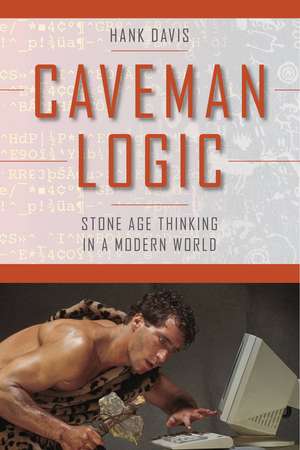Caveman Logic: The Persistence of Primitive Thinking in a Modern World
Autor Hank Davisen Limba Engleză Paperback – 31 mai 2009
These are examples of what evolutionary psychologist Hank Davis calls "Caveman Logic." Although some examples are funny, the condition itself is no laughing matter. In this engagingly written book, Davis encourages us to transcend the mental default settings and tribal loyalties that worked well for our ancestors back in the Pleistocene age. Davis laments a modern world in which more people believe in ESP, ghosts, and angels than in evolution. Superstition and religion get particularly critical treatment, although Davis argues that religion, itself, is not the problem but "an inevitable by-product of how our minds misperform."
Davis argues, "It’s time to move beyond the one-size-fits-all, safety and comfort-oriented settings that got our ancestors through the terrifying Pleistocene night." In contrast, Davis advocates a world in which "spirituality" is viewed as a dangerous rather than an admirable quality, and suggests ways in which we can overcome our innate predisposition toward irrationality. He concludes by pointing out that "biology is not destiny." Just as some of us succeed in watching our diets, resisting violent impulses, and engaging in unselfish behavior, we can learn to use critical thinking and the insights of science to guide individual effort and social action in the service of our whole species.
Preț: 129.20 lei
Nou
Puncte Express: 194
Preț estimativ în valută:
24.72€ • 26.94$ • 20.83£
24.72€ • 26.94$ • 20.83£
Carte disponibilă
Livrare economică 02-16 aprilie
Preluare comenzi: 021 569.72.76
Specificații
ISBN-13: 9781591027218
ISBN-10: 1591027217
Pagini: 298
Dimensiuni: 153 x 226 x 16 mm
Greutate: 0.4 kg
Editura: Prometheus Books
ISBN-10: 1591027217
Pagini: 298
Dimensiuni: 153 x 226 x 16 mm
Greutate: 0.4 kg
Editura: Prometheus Books
Notă biografică
Hank Davis (Guelph, Ontario, Canada) is an award-winning professor of psychology who teaches at the University of Guelph. He is the author of several books on behavioral science and popular culture and more than one hundred scientific papers.
